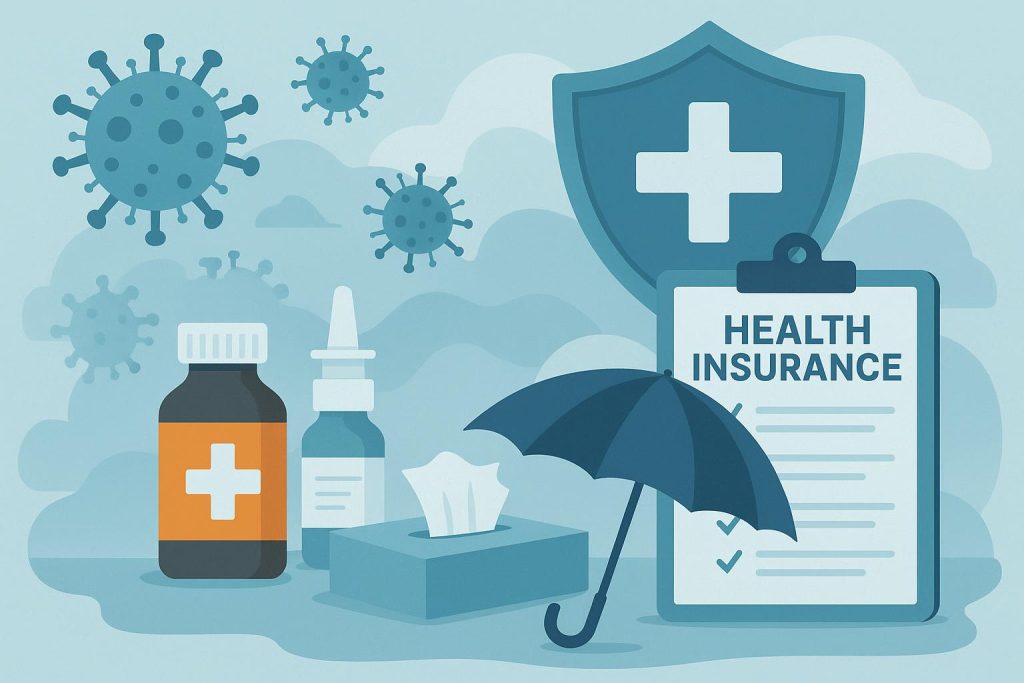With every change in season, certain illnesses seem to make an inevitable return – think viral fevers during monsoon or respiratory infections during winter. Seasonal diseases, such as dengue, malaria, flu and typhoid, affect most people in India. And the financial stress of repeated hospital visits, medication and diagnostic tests piles up quickly. This is where health insurance becomes your shield.
But does your policy cover these common seasonal illnesses? Let’s break it down.
What are Seasonal Illnesses?
Seasonal illnesses are health conditions that become more frequent in specific seasons due to weather patterns, environmental factors and increased transmission rates. Some of the most common seasonal diseases in India include:
- Dengue (common during the monsoon season)
- Malaria (spikes in humid and rainy climates)
- Typhoid (linked with contaminated water and food during monsoons)
- Flu and viral fevers (usually during season transitions)
- Respiratory infections like bronchitis and asthma (flare up during winter)
These conditions might seem mild at first, but can escalate to hospitalisation if not treated in time.
Does Health Insurance Cover Seasonal Illnesses?
Here’s the good news: Most health insurance comprehensive policies do cover seasonal diseases. But there are a few conditions.
What’s generally covered:
- Doctor consultations and diagnostics: Blood tests, X-rays, etc.
- Outpatient care (OPD), if your plan includes OPD benefits
- Hospitalisation expenses: Room rent, nursing, ICU if required
- Daycare treatments for minor procedures
- Post-hospitalisation care: Follow-up treatments and tests
What’s not covered:
- Claims within the waiting period: Most policies come with a 30-day waiting period from the date of purchase
- Non-prescription medicines or over-the-counter drugs
- Treatment without hospitalisation, if OPD isn’t covered
Importance of Reading Your Policy Document
Every policy has its own set of inclusions and exclusions. It is vital that you:
- Check if OPD is included in your plan
- Understand sub-limits and co-payments, if any
- Read the fine print for room rent limits or treatment caps
Often, basic policies cover hospitalisation but exclude OPD care, which is where most seasonal illnesses are treated. Upgrading your plan or selecting a more comprehensive individual health insurance plan may be a wise move.
Why Individual Health Insurance Can Be Better For Seasonal Illnesses
While family floater plans are popular, individual health insurance gives you a dedicated sum insured. That means you won’t have to worry about using up the family’s coverage just because you got dengue.
Key benefits:
- Dedicated coverage
- Higher claim availability for multiple episodes in a year
- Better personalisation with add-ons like OPD or wellness benefits
So, if you often find yourself or a loved one visiting the doctor during season changes, an individual health insurance policy might be worth considering.
Tips To Make The Most Of Your Health Insurance During Seasonal Illnesses
Getting the most out of your insurance doesn’t just stop at buying a policy. Here’s how you can be smart about it:
1. Opt For a Plan with OPD Benefits
Most seasonal diseases require outpatient care. Having OPD coverage can significantly reduce your out-of-pocket expenses.
2. Use Network Hospitals
Always go to a network hospital for cashless claims. This makes the treatment and reimbursement process hassle-free.
3. Maintain Medical Records
Keep prescriptions, diagnostic reports and hospital bills properly documented. This is essential during the claims process.
4. Choose Add-ons Smartly
If you are prone to infections or live in areas with a high risk of mosquito-borne diseases, consider add-ons like daily hospital cash or an OPD rider.
5. Review Policy Annually
Renewing blindly is a no-go. Reassess your health needs and opt for policies that cover what’s most relevant to your lifestyle.
Tips To Stay Protected During Seasonal Peaks
While insurance offers financial protection, you should also take preventive measures, such as:
- Get vaccinated against the flu or other seasonal or regional diseases
- Use mosquito repellents and sleep under nets during monsoons
- Stay hydrated and avoid the direct sun during summer
- Wear masks in high-pollution areas to avoid respiratory triggers
Conclusion
Seasonal illnesses may come and go, but their impact on your finances can be long-lasting. Having the right health insurance ensures you are not burdened with out-of-pocket costs when your health takes a hit.




